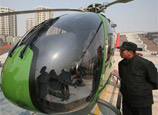
PM2.5, airborne particles with a diameter of less than 2.5 microns, contributed to the deaths of 1.2 million people in China in 2010, according to a report released Sunday by a US research institute.
The report by the Health Effect Institute, a nonprofit organization, makes fine particle air pollution the fourth leading cause of premature death in the county that year.
Nearly half of the deaths were caused by brain diseases related to blood circulations, 23 percent from heart diseases and about 16 percent of the deaths were caused by chronic pulmonary diseases, according to the report.
A poor diet, high blood pressure and smoking were the top three contributions to premature death in the country in 2010.
Fine particulate outdoor and air pollution caused the premature deaths of 3.2 million people worldwide, collectively reducing their lives by 7,600 years, said the report.
The report added that two thirds of the world's health concerns caused by air pollution occurred in developing nations in South, Southeast and East Asia.
Bob O'Keefe, vice president of the institute, said during a press conference Sunday that the report shows air pollution currently affects people in China and other developing countries in Asia the most.
"It means that we have to take effective actions to reduce people's exposure to air pollution," he added.
Earlier this year, major cities in northern parts of the country such as Beijing weathered periods of heavy smog, and PM2.5 and its health hazards have become a top concern for the public.
On several occasions this year, PM2.5 readings in Beijing reached 1,000, while a recommended reading for good health suggested by the World Health Organization is 20.
"Such large scale smog has rarely been seen in the world, as the combined pollution involving PM2.5 and ozone have hampered the economic development in regions including the Capital Economic Circle, the Yangtze River Delta and the Pearl River Delta," Hao Jiming, a researcher with the Chinese Academy of Engineering, said Sunday.
















 Sea burial held in China's Tianjin before Qingming
Sea burial held in China's Tianjin before Qingming


![]()
